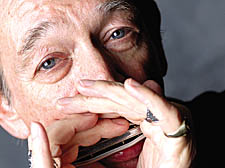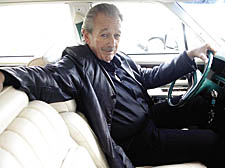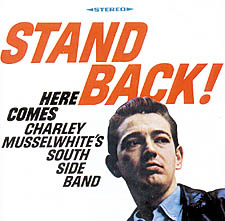|
|
 |
| |


Charlie Musselwhite as he is now and, below, on the cover
of his classic album Stand Back!
 |
Charlie's blowing up a storm for some
justice
Blues legend Charlie Musselwhite
is set to make a stand at the Jazz Café writes Richard Osley
CHARLIE Musselwhite, the celebrated blues harmonica player,
is known more for his music than his politics.
He has spent more time jamming with the genre’s undisputed
legends – Muddy Waters, Sonny Boy Williamson and Howlin’
Wolf were friends, John Lee Hooker was the best man at his wedding
– than crying out from a soap box.
But Hurricane Katrina which caused devastating floods in New
Orleans last August has clearly stirred Charlie into action.
At 62, he is ready to make a stand.
Checking in from his home in California, he repeats: “There
was a storm that everybody could see was coming and they did
nothing about it. The government tell us that they are hear
to protect us from terrorist attacks and everything but here
was a storm that we could all see was coming, everybody could
see it and nothing was done.”
Charlie is a seen-it-all, bought the T-shirt kind of Mississippi
bluesman. He was there in the 1960s, reviled as a white artist
who could present blues properly with his rasping album Stand
Back! And he has hardly let up since.
Recently, he was labelled the world’s greatest harmonica
player by an American newspaper. Charlie will be in the heart
of Camden Town early next month.
It’s not often that he plays in London, so the Jazz Café
in Parkway will surely make the most of his return. There is
a new album too, Delta Hardware, and a couple of songs aimed
at making the point over Katrina.
“I thought somebody had to say something,” says Charlie.
“I haven’t been political before, I have steered away
from that. When people come to a show they don’t want to
hear all that, it is a night out, a fantasy time, they want
to escape from the bad things going on in the world. But what
is going on makes me so mad.”
Katrina left New Orleans under water – in some parts the
floodwater breaking through the bust levee was more than 20
metres deep – and more than 1,000 people dead. The relief
effort from the top down in America was widely criticised for
being slow and largely ineffective for the thousands left with
nothing.
Charlie adds: “Don’t get me started on Bush! All politicians
care about is getting the votes. The poor people in the south
don’t vote, so they don’t care about them. It doesn’t
matter whether they are a Republican or a Democrat, politician
only care about themselves. Not the people. They care about
themselves.”
The way to pull Charlie out of his depression is to return to
his music. He has every reason to be proud of a back catalogue
of nearly 30 albums. His latest efforts are, in part at least,
a return to the beefed-up blues that made Stand Back! such a
success in 1967 and on its re-issue a couple of years back.
Charlie says: “My last few albums have been subdued, really
blue. We wanted to get back to that raw sound of blues. The
rocking sound of blues. We should have fun with it in London,
tell the people to come early and leave late because it will
be a great party.”
In recent years he has toured incessantly “to pay the bills”
and has dates this year across North America, Europe and New
Zealand. He has also recently teamed up with the likes of Bonnie
Raitt and the Blind Boys of Alabama. But given the chance to
interview one of the biggest names in his field you have to
ask about the time he spent hanging out with Muddy, Sonny and
The Wolf – the blues greats whose notoriety is almost as
strong as their raw talent.
Charlie recalls: “I used to sit in with them but I did
my own thing too. They were great times and I remember those
guys fondly. They were friends of mine.”
He was one of few white blues musicians from that era who earned
the right to play a style of music that had been created and
matured by black singers.
In later years, he became the inspiration for Elwood Blues,
the wiry harp-player played by Dan Aykroyd in the 1980s cult
film The Blues Brothers, but his contribution has been far more
important than that.
Charlie adds: “The only static I ever got was from white
purists who didn’t like the fact I played blues and that
I was white. All of the black musicians were fine. We all got
on. They were flattered that I knew their records and their
songs. And, you know, they like the way I played. It was a pretty
tight.”
Muddy Waters played in Camden 40 years ago, zipping into the
Camden Centre in Euston Road for what by all accounts was a
humdinger of a show. Those days may have passed in this country
– there are too few blues clubs in London, there are too
few artists getting it right – but Charlie is determined
that his new show will provide a snapshot of what those great
times were like.
He adds: “Everybody can’t come around to my house
to play. It’s a long way away. So we have to keep going
around the world to play the music. It’s a shame we can’t
stop in London more often but it will be a rocking show. I’m
excited about it.”
|
|
 |
|



